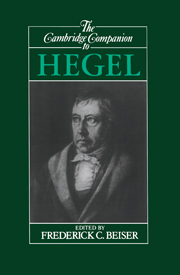Book contents
- Frontmatter
- Introduction
- 1 Hegel's intellectual development to 1807
- 2 You Can't Get There from Here
- 3 Hegel's conception of logic
- 4 Hegel's idealism
- 5 Hegel's dialectical method
- 6 Thought and being
- 7 Hegel's ethics
- 8 The basic context and structure of Hegel's Philosophy of Right
- 9 Hegel's historicism
- 10 Hegel on religion and philosophy
- 11 Hegel's aesthetics
- 12 Transformations of Hegelianism, 1805-1846
- 13 Hegel and Marxism
- 14 Hegel and analytic philosophy
- Bibliography
- Chronology
- Index
14 - Hegel and analytic philosophy
Published online by Cambridge University Press: 28 May 2006
- Frontmatter
- Introduction
- 1 Hegel's intellectual development to 1807
- 2 You Can't Get There from Here
- 3 Hegel's conception of logic
- 4 Hegel's idealism
- 5 Hegel's dialectical method
- 6 Thought and being
- 7 Hegel's ethics
- 8 The basic context and structure of Hegel's Philosophy of Right
- 9 Hegel's historicism
- 10 Hegel on religion and philosophy
- 11 Hegel's aesthetics
- 12 Transformations of Hegelianism, 1805-1846
- 13 Hegel and Marxism
- 14 Hegel and analytic philosophy
- Bibliography
- Chronology
- Index
Summary
What I think, namely that something is true, is always quite distinct from the fact that I think it. . . . That “to be true” means to be thought in a certain way is, therefore, certainly false. Yet this assertion plays the most essential part in Kant's 'Copernican Revolution' of philosophy, and renders worthless the whole mass of modern literature, to which that revolution has given rise, and which is called Epistemology.
It is often thought that analytic philosophy arises, at least in part, from a reaction against Hegel, or against philosophy inspired by Hegel. To some extent this is correct. The philosophy of Bertrand Russell and G.E. Moore in the first decade or so of this century, which was enormously influential for subsequent analytic philosophy, was developed in conscious reaction to idealist views that owed much to Hegel. This fact, however, does not settle the question of the influence of Hegel, either on Russell and Moore or on analytic philosophy more generally; all that it does is to give us a way of posing the question. And the question is a complex one. Besides the general difficulties involved in tracing the influence of a view as complex as Hegel's, there is also a particular problem arising from the relation between Kant and Hegel.
- Type
- Chapter
- Information
- The Cambridge Companion to Hegel , pp. 445 - 486Publisher: Cambridge University PressPrint publication year: 1993
- 4
- Cited by



